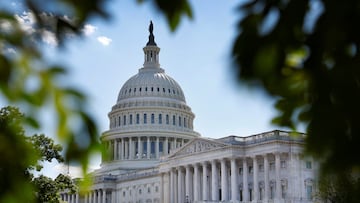Could there be a US government shutdown before the election?
The next fiscal year begins on October 1, a month before the presidential election. Could a government shutdown occur?

One month before the presidential election, on October 1, the next fiscal year begins. Before it starts, the US Congress must approve a budget to fund government operations. Failure to do so could have serious consequences.
When the government’s funding for its discretionary spending programs expires and Congress has not passed a budget to fund government operations, a government shutdown occurs.
Approval and signature must occur before the start of the new fiscal year, which begins each year on Oct. 1. If Congress does not pass the legislation, the Treasury Department cannot spend money and agencies must cease nonessential operations until Congress approves the funding and signs it into law.
At this time, Congress has not passed a bill to keep federal agencies and programs running. According to an Associated Press report, House Speaker Mike Johnson has postponed a vote on a temporary spending bill that would keep funding going for six months.
You may be interested in: COLA estimates for 2025: How much would Social Security benefits increase?
Why is the bill to keep the government funded not being passed?
The legislation has not been approved in Congress because representatives from both parties have not reached an agreement, as the bill includes a measure requiring people registering to vote to provide proof of citizenship.
Congress needs to pass a stopgap spending bill by Oct. 1 to avoid a federal shutdown a month before the Nov. 5 election.
19 DAYS to government shutdown. House Republicans STILL haven’t presented a bill that fully funds the VA. @HouseGOP, VETERANS ARE NOT YOUR PAWNS. Get your hands off our benefits, and start doing your job. https://t.co/q9ycKkkGcr
— VoteVets (@votevets) September 12, 2024
How does a government shutdown affect Americans?
The length of a shutdown can vary, as it depends on when Congress can come to an agreement on funding. If the shutdown is short, most Americans won't feel much of an impact, but if the government shutdown lasts more than 30 days, there could be larger impacts.
A shutdown would affect both essential and non-essential workers. Although they continue to work during the shutdown, essential employees are not paid while the government is closed. They receive back pay once funding is restored to their agency.
As for employees in non-essential positions, they are suspended until the government receives funds again. In some cases, where the closure is extended, there may be layoffs.
On the other hand, the closure would affect some non-priority functions and procedures. The disbursement of Social Security checks, Supplemental Security Income (SSI), as well as Medicare benefits, are not usually affected, since they are a priority. Essential services, such as the post office, will also continue to operate.
Related stories
However, benefit verification, Medicare card replacement, Social Security card issuance, and other procedures could be halted. Passport applications could also be disrupted.
Other IRS processing, such as refunds, could also be affected. In addition, the delivery of some SNAP and food stamp benefits could be halted.


Complete your personal details to comment